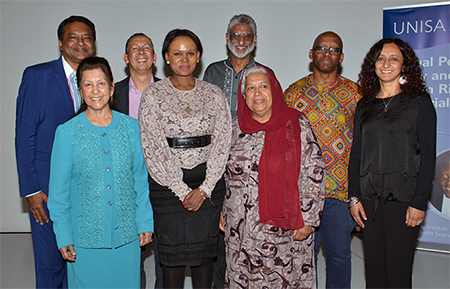Leading change
In defence of a human rights culture

Dr Saths Cooper, Farida Omar, Prof Ashley van Niekerk, Thandeka Gqubule-Mbeki, Prof Mohamed Seedat, Latifa Omar, Prof Kopano Ratele, and Prof Shahnaaz Suffla
On 25 April 2018, the Unisa College of Graduate Studies (CGS) and its Institute for Social and Health Sciences (ISHS) hosted the 13th Annual Peace, Safety and Human Rights Memorial Lecture at the Apartheid Museum in Johannesburg. This lecture took place at a time of social and political upheaval in South Africa and all the speeches of the night focused on the complexities faced by the country. The ISHS had the privilege of hosting Thandeka Gqubule-Mbeki as the keynote speaker and Prof Saths Cooper as the respondent.
The lecture draws on the legacies of Abdullah Omar and Joe Moabi, who fought an uncompromising battle against inequality and oppression and embodied compassion, self-respect, and dignity despite being faced by momentous struggles. Their legacies remind us that the fight against oppression and inequality consistently requires renewed commitment to equality and freedom, and that we need to guard against complacency.
The keynote speaker, Thandeka Gqubule-Mbeki, is Economics Editor at the SABC, where she is responsible for economics, business and financial markets coverage of the corporation across TV, radio and digital media. Here she became involved in a struggle for independent public broadcasting and freedom of expression, joining a group called the SABC8. She delivered an addressed entitled In defence of a human rights culture, which had an urgent appeal for us not to yield to populism but to maintain the “democratic humanism of our Constitution” and she urged her listeners to defend the culture of human rights.
Clinging to human rights in the face of increased populism
Opening her lecture, Gqubule-Mbeki located South Africa in reference to social and political disruption and stated that “how we choose to meet the challenges of social change is important.” She offered two options: “Do we choose the democratic humanism of our Constitution? Or do we yield to populism because it offers quick popular solutions to pressing problems of our time—such as our land inequity and a lack of economic justice?” Gqubule-Mbeki strongly encourages a clinging to human rights in the face of increased populism.
She said the country had “borne witness to a bumpy transfer of power between two factions of the ruling party. We have also seen civil society assert itself against abuse of power, corruption and misrule. We are also witnessing the rise of nativists and populism that seems to erode the gains of the rights culture previous generations have tried to foster.” She located her own struggles and those of other journalists, both in the anti-apartheid struggle and in contemporary South Africa. These continuities, she asserts, tells us that “the scars of the past are still with us”.
Through a humanist lens
Gqubule-Mbeki proposed that one solution to these difficulties was to take on a humanist lens. She then provided a brief history of the origins of humanism and the link of human rights and humanism. She particularly located the development of humanism in Africa. Gqubule-Mbeki linked the history of humanism and South Africa and stated: “I believe we as South Africans need to negotiate a new social compact, under the tree of our rights-conscious Constitution. This is the only way to bridge the divides and chasms that confront us. If we are unable to create a social contract, we may then descend into a Hobbesian nightmare of violence and the loss of security.”
Thirty years of commitment to science with compassion
The ISHS also used the occasion of the 13th Annual Peace, Safety and Human Rights Memorial Lecture to launch their report, Thirty years of commitment to science with compassion in the service of humanity: 1986–2016. This was a fitting backdrop for the launch, as the report documents the ISHS’s own uncompromising battle against inequality and oppression and embodies its compassion and commitment to respect and dignity. The book serves to honour the momentous struggles and victories that the ISHS has faced over the last 30 years.
It is Unisa’s privilege to continue to memorialise the legacies of Dullah Omar and Joe Moabi through hosting speakers at these annual lectures such as Thandeka Gqubule-Mbeki who continue to strive for the realisation of human rights, freedom of speech, and humanism. As Gqubule-Mbeki ended her lecture, so we end this article: “We need to demand more public, social, and economic high-mindedness and ambition from those who lead us into our shared future. We need to defend the culture of human rights—it is the glittering treasure of all humanity and it will continue to speak constructive truth through the ages. That truth is that umuntu ngu muntu ngabantu. (A person is a person because of other people.)
*By Sarah Day
Publish date: 2018/05/11